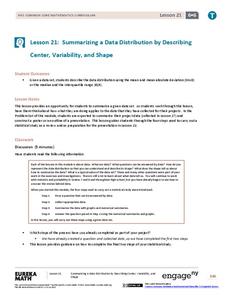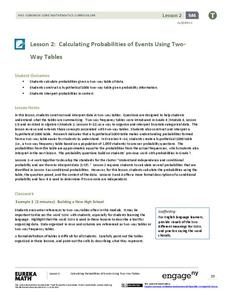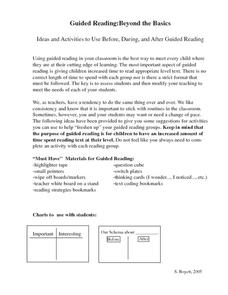Polk Bros Foundation
How to Summarize a Non-Fiction Passage
After reading a text, one way to find out how much your class comprehended is to ask your pupils to summarize. This worksheet helps class members prepare for writing a summary of a nonfiction text. They note down the topic, up to eight...
E Reading Worksheets
Summarizing Text
Help learners find the most important information in a text with a lesson on summarizing. As kids read through a passage about Johannes Gutenberg, they summarize small excerpts, put events in sequential order, and respond to two longer...
Freeology
Summarizing
Scholars draft a summary using a graphic organizer featuring a story's characters, setting, main events, conflict, and resolution.
EngageNY
Summarizing Bivariate Categorical Data
How do you summarize data that cannot be averaged? Using an exploratory method, learners complete a two-way frequency table on super powers. The subject matter builds upon 8th grade knowledge of two-way tables.
EngageNY
Solving Equations Using Algebra
Use a tape diagram to emulate the steps of solving equations. The 23rd installment in a 25-part unit presents two-step linear equation problems to solve. Pupils use tape diagrams to solve the problems along with linear equations. To...
Polk Bros Foundation
How to Summarize an Event in History or Today - or a Story
Ask your class to write a quick summary of a historical or current event. The worksheet offers a place to note down important details about the event, such as time, place, people, how it started, and how it ended. Pupils then take this...
Syracuse City School District
Summary of Fiction and Non-Fiction Text
Somebody Wanted But So Then (SWBST)? Yes! Here's a great strategy for teaching young readers how to summarize narrative text. In addition, the packet includes exercises that show kids how to summarize nonfiction text using the classic...
K12 Reader
Summarize It: President Theodore Roosevelt's 7th Annual Message to Congress
How did Theodore Roosevelt stress the importance of conservation during his time as president of the United States? Take a closer look at the language Roosevelt used himself in a 1907 address to Congress, and have your young...
EngageNY
Summarizing a Data Distribution by Describing Center, Variability, and Shape
Put those numbers to work by completing a statistical study! Pupils finish the last two steps in a statistical study by summarizing data with displays and numerical summaries. Individuals use the summaries to answer the statistical...
Curated OER
Summarizing with Somebody Wanted But So
Teach your young readers how to summarize a text using a strategy called Somebody Wanted But So. Kids identify the character (Somebody), the motivation (Wanted), the conflict (But), and the resolution (So). The resource comes with...
Baruch College Writing Center
Summarizing, Paraphrasing, and Quoting Workshop
What's the difference between summarizing and paraphrasing? Show class members how to find the main ideas from informational text and condense it, restate it, or quote it directly with a series of educational activities based...
EngageNY
Describing Variability Using the Interquartile Range (IQR)
The 13th activity in a unit of 22 introduces the concept of the interquartile range (IQR). Class members learn to determine the interquartile range, interpret within the context of the data, and finish by finding the IQR using an...
EngageNY
Summarizing Informational Text: “Hawaii’s Endangered Happy Face Spider”
Put on a happy face. Using an interesting resource, pupils read an informational text about Hawaii's endangered Happy Face Spider. Next, they participate in a jigsaw discussion to find the gist of the article.
EngageNY
Calculating Probabilities of Events Using Two-Way Tables
Tables are useful for more than just eating. Learners use tables to organize data and calculate probabilities and conditional probabilities.
EngageNY
Preparation for Performance Task: Using Writing to Make Prompt Cards
Writing becomes dynamic in a presentation. Presenters transform a piece of writing they have already composed about the Little Rock Nine into a presentation. The focus is transferring ideas from their writing into short prompts on cards...
Ideas From Suzi
Guided Reading: Beyond the Basics
Elevate children's reading comprehension skills with this collection of guided reading resources. From paper dice with basic comprehension questions printed on them to a system for using sticky notes to identify key...
Education Center
Safety Sequence
Follow up a class reading of the children's book Officer Buckle and Gloria with this simple sequence-of-events worksheet. Including pictures of six key moments from the story, young learners must first number them in the correct...
Polk Bros Foundation
I Can Analyze a Story or History Completely and Carefully
Start off analysis of a text with a activity that asks pupils to complete several tasks. Class members note down a couple of characters or people and their distinguishing traits, describe the most important event, summarize the text...
Polk Bros Foundation
Show, Then Write What You Learn
After reading a text or covering a new topic, have class members fill out the four boxes on this page with facts. Individuals can use words or drawings to represent the facts.
Mary Pope Osborne, Classroom Adventures Program
The Backpack Travel Journals
Strap on those backpacks, it's time to travel through history with this literature unit based on the first four books of The Magic Tree House series. While reading through these fun stories, children create story maps, record...
Anchorage School District
Hints for Writing a Conclusion
Writing the conclusion of an essay can often seem like a superfluous or daunting task. Support your young writers in understanding the various types and purposes of a conclusion paragraph, such as summarizing key points of a paper or...
Polk Bros Foundation
Science Learning Summary Guide
Apply reading standards to your science curriculum by asking pupils to complete this guide. Individuals note down important vocabulary as well as two ideas they learned and two supporting facts for each idea. They then take this...
EngageNY
Problem Solving Using Rates, Unit Rates, and Conversions
Find a way to work with rates. The 23rd part in a 29-part series presents work problems for the class to solve given work rates. Pupils compare rates to determine which is faster. Some problems require learners to convert the rates to...
Serendip
How Do Biological Organisms Use Energy?
When an organism eats, how does food become energy? Young biologists follow glucose through the process of cellular respiration to the creation of ADP using a discussion-based activity. The resource also highlights conservation of mass...
Other popular searches
- Summarizing Using Stellaluna
- Summarizing Using 5 Ws
- Summarizing Using Key Ideas
- Summarizing Using Stealing
- Summarizing Using 5 Sw























